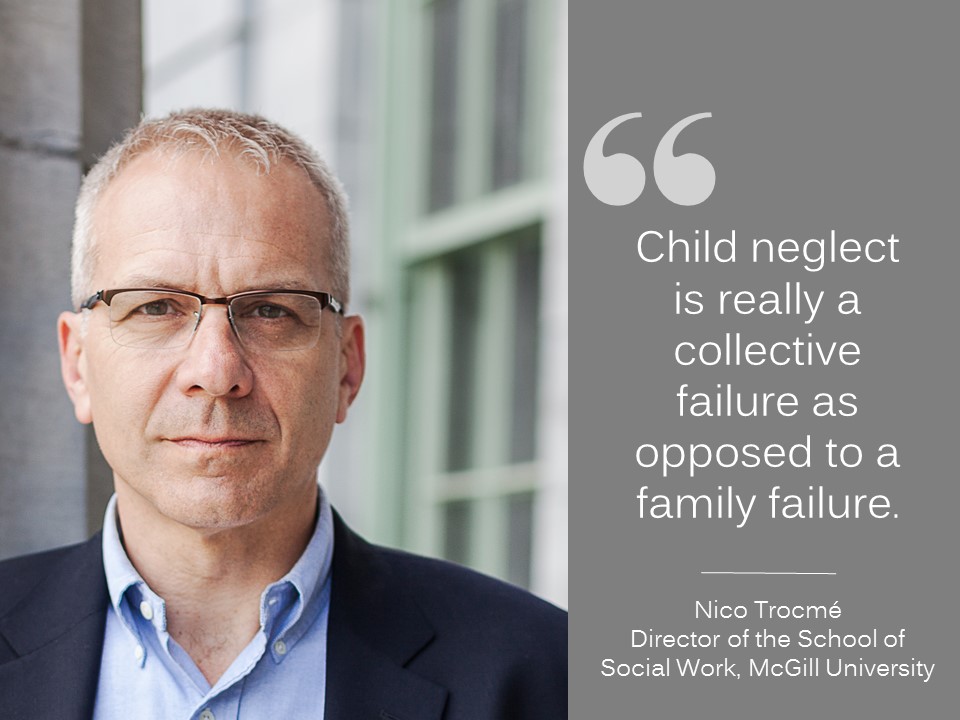You consider the correct understanding of neglect in child protection to be tremendously important. Why is that?

Across North America, neglect is the most frequently reported form of child maltreatment. First, the sheer number of children who are reported as neglected makes it important to talk about. Second, there’s ample evidence – hundreds of studies – that shows that whatever is getting labelled as neglect is devastating in terms of its long-term impact on children. On pretty much on any measure that one can think of – cognitive development, social development, emotional development, number of words spoken, reading capacity – children who are labelled neglected come out looking as bad or worse than any other group of children.
Can you help us understand how you understand child neglect?
Talking about child neglect is complicated. This is because the term “neglect” itself is an unfortunate, in fact very problematic, term. It’s a term we inherited through the history of the development of child welfare in North America and that appears in our child protection legislation as a category of maltreatment. But it is not a particularly helpful term. It’s inaccurate, it’s mother-blaming, it lumps together very different situations that do not fit a coherent set of diagnostic principles.
What advice would you give somebody trying to determine whether a child or youth they know is suffering from neglect?
You need three very separate components in place to have a situation that I would really consider to be neglect. First of all, you need to have a parent who, for a range of reasons, is not able to fully meet the needs of their child. This could be the case because of cognitive limitations, mental health issues, a particular health crisis, addictions, family violence and so on. It’s partly this broad range of problems faced by a parent which makes the definition of neglect so difficult. One parent could be 17 years old and just not developmentally ready to be able to be a parent without sufficient support. For another parent it could be substance abuse or an emerging personality disorder. There isn’t a core syndrome that defines neglect.
These parenting limitations you just described don’t lead to neglect on their own?
Family conflict happens. Substance abuse happens. Families separate. You or I could be in a situation where either we or our partners develop a drinking problem. These things happen. The trouble is that from the very outset the behaviour that we’re trying to define as being neglectful is highly contingent on the parenting context. In middle-class, reasonably well-supported environments where there are well-resourced schools, good sports and recreation programs, where there are a lot of supports wrapped around the child, where there are grandparents, extended family, neighbours that are there to buffer the effects of any particular crisis, these problems are unlikely to become neglect. So, this leads me to the second component to the definition of neglect, which is that personal or interpersonal problems faced by parents are much more likely to lead to neglectful situations in highly impoverished environments. What’s critical is that not only do you have a limitation at the level of parent, but because of the environment they’re in, one that lacks protective factors at the level of the school, the neighbourhood, extended family, etcetera, the stakes are that much higher. The kind of situations that families labelled as neglectful are going through are very similar to the kind of situations that families living in better financial circumstances also go through. But these families have enough additional resources to keep these situations from escalating into a crisis where the needs of the child are not being met.
What is the final component that you think needs to be present for a child to be identified as neglected?
The third component is probably the most controversial one, and that is the resilience of the child. There are a lot of children who can manage through quite a bit of chaos and do quite well, and for whom a label of neglect is not necessarily helpful. So, you could have a high-risk environment, you could have a parent going through very difficult circumstances, and a relatively easy child, a relatively resilient child, who’s just going to manage fine.
But there are other children who are more vulnerable. You can have the very same situation and a child who has more needs, whatever they might be, and that child is much more likely to have difficulties as a result of family problems. We know this to be true from our collective experiences in well supported family environments. Some children as of birth don’t sleep well, are harder to manage, are more demanding on their parents. We all have gone through that, a feeling like, “Can I manage this? Can I meet the needs of the child?” We manage because of all the additional supports we have access to. But these parenting challenges are much more difficult for a parent living in extreme poverty with few social supports.
What are the implications of this multi-layered definition of neglect that you are suggesting?
The label neglect is problematic because it seems to attribute responsibility only to one level, which is the parent. But neglect is really a collective failure as opposed to a family failure. Take failure to supervise as an example. You might have a parent who’s working a night shift and a seven-year-old coming home unsupervised. Who is being neglectful? Is it the school who knowingly sends the child home to a working parent who can’t be home? Or is it the parent who can’t afford anything else? For whatever reason, we’ve decided to call the parent the neglectful person. But the school knows fully well that the child is going home to that situation and hasn’t developed an affordable after-school program. We don’t report the school. We report the parent.
So what approach do you suggest should be taken in these kinds of situations?
What we really need to focus on is the needs of child that are not being met, rather than trying to determine if these problems are due to “neglect.” This shift in perspectives refocuses our assessments on the context of the full “ecology,” or environment, of the child. Such a shift brings the schools, daycares, and health professionals together with child welfare workers and parents in collectively seeking the best way to ensure that the child’s needs are met. If you engage parents around the success of their child as opposed to their parenting failure to meet the child’s needs, you are much more likely to successfully engage them. The objective needs to shift from changing the parent to helping the child.
